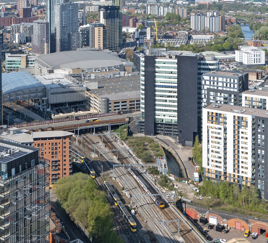The Office of Rail and Road calculates that government funding for the railway increased by £10.4 billion in 2020-21, reaching a total of £16.9bn. Some £2bn of funding support has been provided to the bus industry in England.
The study finds: “The value for money obtained from sustaining these services through the pandemic could be massively undermined if the transition post-pandemic is not managed carefully.”
Pruning services now to match reduced demand is not favoured.
The Treasury has already begun to demand significant cost reductions (around 15% per annum) from train operating companies. Reduced timetables are already being run.
The report argues that cutting services in this way would entrench social inequality, in direct contradiction to the Levelling Up White Paper - particularly in terms of making access to employment more difficult.
A strong public transport network is seen as invaluable in the response to the pandemic. In deciding when and how to turn off the financial tap to recovery funding, there is a greater need to reassess the effect that would have.
“The traditional business case is that as people get richer, they travel more,” observes Stephen Joseph.
“The Department for Transport has assumed this over the last 50 years. Or more. That’s just not true now. Quite rich people do not travel as much as they used to.
“With decarbonisation as an imperative, there is an opportunity to embed some of the changes that have happened. Supporting them with policy to smooth demand and integrate hybrid working - for example, by removing any benefit from having a company car.
“The really strong point here is that trends from COVID that have been seen as negative - people not travelling - are an opportunity that can be harnessed. This is a chance to support public transport, and rail in particular, but not necessarily for the reasons that were talked about before.”
Professor Docherty asks: “At the same time, who is paying for this and how much is it costing us?
“There are some really difficult questions. Before the pandemic, we already knew that rail passengers were better off and had more choices than the general population.
“Yet we subsidised the rail industry massively more than the buses. Now, in 2022, we have a situation where the bus network, which got key workers to front line employment during the pandemic, is in big trouble with cuts.
“What is the real impact of the differential in subsidy between the modes now? What is the socio-economic benefit of all this money that is going into rail subsidy? The rail sector needs to come up with much better answers than it currently has.
“The rail industry is a middle-class subsidy. That has come into sharp relief in the pandemic. If we want to ‘build back better’ and learn from the experience, doing something useful about tackling poverty, we need to think about who actually benefits from all that rail subsidy. None of this is easy for the sector.
Professor Anable adds: “We are in such a danger zone. Such a critical period. There is, as yet, no focus on this.
“All the evidence about decarbonisation points to an absolute need to reduce car use, and by more than the current amount, so we need to lock that in. The way in which we lock that in is not through making people walk or cycle instead, although that is part of the story. That can’t compensate for car use overall.
“Leisure travel is the area around which we have no policies. It is the hardest area of travel to impact. By definition, it is discretionary - it represents free time, wellbeing, identity. Much more so than the commute. We cannot reach the travel reduction we need without big dents in the degree to which we make longer-distance leisure journeys, and in particular by car.
“There is no real thinking about how the railways could be reoriented around this imperative. It is a total shift in relationships with destinations.
“For example: national parks. We need big changes, such as the national parks banning private cars, so you can only get there by train, coach or bus, and have some cars available to use when you get there.
“A complete change of conversations, joined up across a wide range of actors that do not normally speak to each other at all. We are starting from zero.”
Professor Docherty: “Only very recently has international travel been possible. There is probably a lot of pent-up demand. Last summer, rail leisure travel did very well. There is a default assumption that is going to be the norm. It might not be. Our horizons of uncertainty might be quite long.
“There is a profound question: if travel is substantially different, what does that mean for the rail network? How will it be modified if there is 50% less commuting - twice instead of four times a week?
“There are a whole range of societal adjustments going on. People are trying to work out what the new normal is. During the next few months that might settle. People are finding a way between the blend of physical workplaces and home working. A whole bunch of variables are in play, including how happy people are at not spending their money on tickets.
“Given the amount of subsidy, what is the railway meant to do for us in the future?
“Previously it was about supporting more commuting and growing the service economy. That is challenged now, empirically.
“So, why are we spending all this money on the rail network? What is the return? That is a new question. How credible is this investment in a different future?














